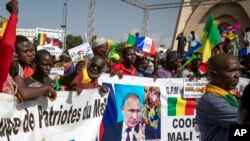On January 11, the United Nations Security Council discussed whether to back an embargo imposed by West African states against Mali’s military government. Russia and China blocked the move.
U.N. ambassadors from the United States, France, the United Kingdom and other countries criticized Mali’s transitional government for bringing in the Wagner Group, a Russian private military company.
“Based on their pattern of human rights abuses, and threats against U.N. peacekeepers in other contexts, they could pose a danger to peacekeepers and to the people of Mali,” U.S. Ambassador Linda Thomas-Greenfield said.
French Ambassador Nicolas De Riviere said the Wagner Group mercenaries “are known to threaten civilians, loot resources, violate international law and the sovereignty of states.” He added that Mali’s transitional authorities “are using already limited public funds to pay foreign mercenaries instead of supporting the national forces and public services for the benefit of the Malian people.”
(Polygraph.info has previously reported on the secretive Wagner Group’s checkered record in Africa, including multiple alleged rights abuses.)
Malian Ambassador Issa Konfourou flatly denied any private mercenary presence, though he claimed Russian “trainers” were in Mali:
“Some members of the Security Council accused the Malian government of using a private security company. Those engaging in this false information campaign are fully aware that Mali has no commitment with any private security company.
“There are no mercenaries present on Malian soil. We have maintained a relationship of a state-to-state cooperation with the Russian Federation. This has been a case since 1960, and it is indeed in furthering this cooperation that Russian trainers are currently present in Mali to advice and train the Malian military personnel on the use of material acquired by Mali from the Russian Federation.”
That statement is misleading based on voluminous media reports and comments by the Kremlin’s top diplomat.
The Maliactu.net news site reported in April 2019 that Mali’s “Group of Patriots of Mali” had been pushing for Russian military intervention in the country since 2017.
Reports indicate that the Group of Patriots of Mali works closely with the Russian Embassy in Bamako, Mali’s capital, and may receive Russian government financial support. The Group organized demonstrations calling for the Russian intervention and has been actively pushing a pro-Russian agenda via its Facebook page.
On September 15, 2021, Maliactu.net news site quoted a Malian defense ministry spokesperson as saying that, “Malian public opinion is in favor of increased cooperation with Russia given the security situation,” but that “no decision” had been taken “on the nature of this cooperation.”
In late 2019, Agence France-Presse (AFP) spotted a “small Wagner team” in Mali soon after its then-president, Ibrahim Boubacar Keita, signed a military cooperation agreement with Russia.
In mid-September 2021, African media outlets reported the Malian transitional government’s contacts with Wagner and Russian lobbying efforts to sign a contract.
“[E]nvoys from the Wagner group have been lobbying the Malian transitional authorities” for several months, Africa Report noted at the time.
Reuters reported on September 13, 2021, that negotiations between Mali and Wagner were “close to signature.” Citing four security sources, the news agency said that “the Wagner Group would be paid about 6 billion CFA francs ($10.8 million) a month for its service.”
Three days later, Radio France International quoted sources in the French defense ministry as confirming that “the Malian government was on the verge of reaching an agreement with the controversial Russian firm.”
Along with with the media reports, a forum called “Russian moves in Mali” was launched on Russiandefence.net, a website known to be popular among Russian military service members.
Then, in late September and again in November, Russian Foreign Minister Sergey Lavrov said the Malian government was in talks with a Russian private military company but denied Russian state involvement.
Lavrov also said Russia continued to supply the Malian government and armed forces with “the necessary hardware, equipment, munitions, and weapons,” and “train Malian officers at defense military colleges” in Russia. As part of its foreign influence effort, the Russian government sponsors scholarships for some 15,000 foreign students annually. Traditionally, a majority of the recipients is selected from African countries, including Mali.
In October 2021, the Criticalthreats.org intelligence website reported in its “Africa File” that Mali’s government would “likely sign a security deal with Kremlin-backed private military contractor Wagner Group.”
The report said the agreement would not concern countering terrorism, and that Russian mercenaries would be providing security to top Malian government officials, as well as protecting two gold mines and a magnesium mine.
On January 6, Mali’s defense ministry announced the deployment of Russian military personnel to Timbuktu in northern Mali to train the Malian forces, but it did not provide any details, including how many Russian soldiers were in the country. Reuters reported that local residents saw “uniformed Russian men were seen driving around town but could not say how many there were.”
On January 7, Criticalthreats.org reported that Wagner was already on the ground in Mali, and “its activities will likely worsen popular grievances and accelerate the deterioration of counterterrorism pressure, allowing Salafi-jihadi groups to strengthen.”
Based on data gathered from the social media and open-source intelligence, the report concluded:
“The Wagner Group deployed personnel to Mali in November and December 2021, arriving in the capital, Bamako. Wagner personnel deployed to central and northern Mali in early January 2022. Wagner forces clashed with members of al Qaeda’s Mali branch, Jama’at Nusrat al Islam wa al Muslimeen (JNIM), in central Mali’s Mopti region on January 3. Likely Wagner forces occupied a base in Timbuktu on January 6 following the November 30 departure of French Operation Barkhane troops. The Malian government reported that Russian personnel would train Malian troops at the Timbuktu base.”
Also on January 7, the African news site Modernghana.com, citing sources in the Malian military and government, reported that about 400 Russian military personnel, including both “advisors and mercenaries,” had arrived in Mali “in recent weeks.”
As of January 7, the European Council of Foreign relations project “Mapping Armed Groups in Mali and Sahel” reported that Wagner teams were in Timbuktu, Bamako and Djenne.
On January 6, France24 reported that, thanks to “local and international testimony,” it was “able to confirm” that at least one member of Wagner group was wounded when Islamist insurgents attacked Malian government forces on January 3.
On January 13, Cybershafarat.com, which monitors terrorist activities around the world, reported that Islamic State fighters in Mali released a video showing the aftermath of an attack on Malian armed forces. The date and place corresponded with the January 3 attack. The footage showed the remains of a white male killed by a roadside bomb. The jihadists promised, “We will make them cry Insha Allah,” and claimed the victim was from the Wagner Group, Cybershafarat.com reported.
On January 14, Bamako-based Voice of America reporter Annie Risemberg called the Russian Embassy to ask a press officer about the claims that a Russian soldier was killed or wounded.
The man who answered the phone replied, “No, it's false, there aren't any Russians here; it's false,” and then hung up without giving his name.
Mali has been wracked by a civil conflict for a decade. United Nations peacekeepers led by France have helped the government fight Tuareg secessionist rebels in the south and radical extremists in the north since 2012.
The United Nations said the extension of military rule in Mali is an obstacle to restoring democracy. “Insecurity has expanded, the humanitarian situation has deteriorated, more children are of out of school and the country has been affected by an endless cycle of instability,” U.N. special representative in Mali El-Ghassim Wane told the Security Council on January 11.






